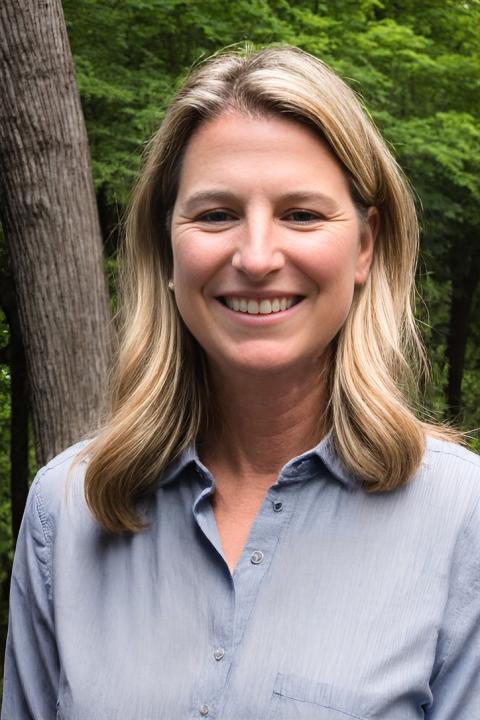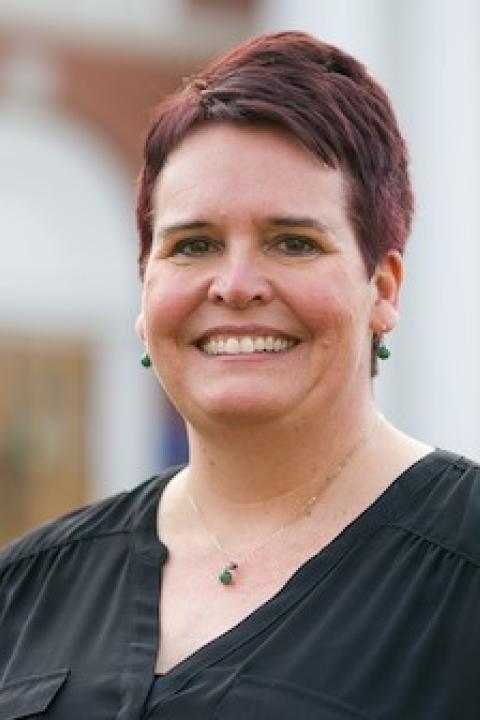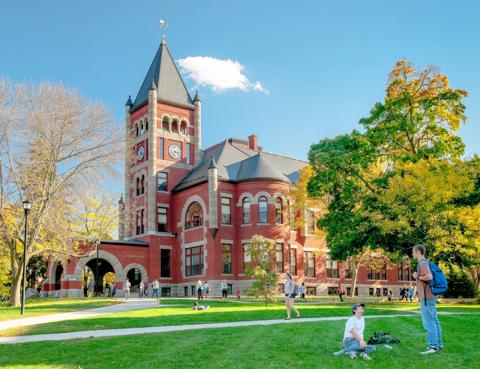WHAT IS HUMAN DEVELOPMENT AND FAMILY STUDIES?
Human development and family studies is an applied, interdisciplinary field that draws from disciplines ranging from developmental psychology, education and sociology to examine how individuals and families develop across the lifespan and the role of key contexts in their growth and development. Students pursuing this program are prepared through coursework and real-world laboratory, practicum and internship experiences to work in direct-service positions promoting developmentally appropriate and evidence-based best practices. The Family Lifespan and Development option focuses on development within the context of families, close relationships, and communities, as well as understanding and supporting development across the entire lifespan.
WHY STUDY HUMAN DEVELOPMENT AND FAMILY STUDIES AT UNH?
Students in the human development and family studies program at UNH receive high-quality undergraduate instruction and advising. As a major public research university, UNH emphasizes hands-on experience and research opportunities. Students have multiple opportunities to put theory into practice through the Child Study and Development Center and community-based settings that serve individuals and families.
POTENTIAL CAREER AREAS
- Child and family support organizations
- Courts and corrections systems
- Development or support organizations for children, youth or seniors
- Family or workplace education programs
- Government agencies–administrative or human services
- Policy analysis, advocacy or research
- Schools (K-12, early childhood)
- Youth development programs
From the CHHS Blog
Curriculum & Requirements
Human Development and Family Studies (HDFS) is an academic discipline focused on understanding the development of individuals and families over time and across the ecological contexts in which they live. HDFS is an applied field of study and a versatile undergraduate major for students interested in working to enhance the lives of individuals and families through in-demand careers in settings that include early childhood education, schools, hospitals, and social service agencies. The HDFS curriculum offers students the opportunity to take courses from child and adolescent development to adult development and aging; family, parenting, and interpersonal relationships; classroom curriculum, observation, and assessment; and family programming, policy, and law. Courses in the HDFS major emphasize diverse experiences across age, gender, race and ethnicity, nationality, and socioeconomic status and prepare students for inclusive programming and practice.
As a major public research university, UNH emphasizes hands-on experience and research opportunities for undergraduate students. Students in the Human Development and Family Studies program are provided with opportunities to put theory and research into practice through practicum and internship courses in the Child Study and Development Center, and many schools and community-based organizations across the Seacoast region of New Hampshire.
Sample Degree Plan
This sample degree plan serves as a general guide; students collaborate with their academic advisor to develop a personalized degree plan to meet their academic goals and program requirements.
| First Year | ||
|---|---|---|
| Fall | Credits | |
| ENGL 401 | First-Year Writing | 4 |
| HDFS 525 or HDFS 545 | Human Development 1 or Intimate Relationships and Families | 4 |
| Discovery Course | 4 | |
| Discovery Course | 4 | |
| CHHS First Year Seminar | 1 | |
| Credits | 17 | |
| Spring | ||
| HDFS 525 or HDFS 545 | Human Development 1 or Intimate Relationships and Families | 4 |
| HDFS 555 | Research Methods in HDFS | 4 |
| Discovery Course | 4 | |
| Inquiry Course | 4 | |
| CHHS First Year Seminar | 1 | |
| Credits | 17 | |
| Second Year | ||
| Fall | ||
| Development Course 2 | 4 | |
| HDFS 641 | Parenting Across the Life Span (or course selected in consultation with advisor) 1,3 | 4 |
| Discovery Course | 4 | |
| Discovery Course | 4 | |
| Credits | 16 | |
| Spring | ||
| HDFS 641 | Parenting Across the Life Span (or course selected in consultation with advisor) 1,3 | 4 |
| Development Course 2 | 4 | |
| FLD Elective 4 | 4 | |
| Discovery Course | 4 | |
| Credits | 16 | |
| Third Year | ||
| Fall | ||
| HDFS 746 | Human Sexuality (or course selected in consultation with advisor) 3 | 4 |
| FLD Elective 4 | 4 | |
| FLD Elective 4 | 4 | |
| Course selected in consultation with advisor 3 | 4 | |
| Credits | 16 | |
| Spring | ||
| HDFS 746 | Human Sexuality (or course selected in consultation with advisor) 3 | 4 |
| Discovery Course | 4 | |
| Discovery Course | 4 | |
| Course selected in consultation with advisor 3 | 4 | |
| Credits | 16 | |
| Fourth Year | ||
| Fall | ||
| HDFS 757 | Race, Class, Gender, and Families (Capstone (or course selected in consultation with advisor)) 1,3 | 4 |
| Major Supporting Course 5 | 4 | |
| Major Supporting Course 5 | 4 | |
| Course selected in consultation with advisor 3 | 4 | |
| Credits | 16 | |
| Spring | ||
| HDFS 757 | Race, Class, Gender, and Families (Capstone (or course selected in consultation with advisor)) 1,3 | 4 |
| Major Supporting Course 5 | 4 | |
| Major Supporting Course 5 | 4 | |
| Course selected in consultation with advisor 3 | 4 | |
| Credits | 16 | |
| Total Credits | 130 | |
- 1
Students should enroll in each listed course only once.
- 2
Refers to development courses.
- 3
Students should use these credit hours towards a dual/double major, minor, accelerated master's program (senior year if applicable), or as general elective coursework.
- 4
FLD Electives refer to 'Family Services & Institutions' courses.
- 5
Students should consult their advisor to determine if a course outside of HDFS meets the supporting course requirements. The Community Internship satisfies supporting course requirements. Students who do not complete the internship must earn at least four supporting course credits within HDFS.
Degree Requirements
All Major, Option and Elective Requirements as indicated.
*Major GPA requirements as indicated.
Major Requirements
The core curriculum required of each Human Development and Family Studies student is designed to give a broad introduction to individual and family development and interpersonal relationships across the lifespan. Building off this curriculum, each student can specialize in one of three options, Child Development, Early Child Education Teacher Licensure, or Family and Lifespan Development which guide further required coursework. Faculty advisors support students in selecting coursework to best prepare them for their specific career objectives. In their senior year, students complete a capstone course and may participate in a year-long community-based internship experience.
Candidates for the Human Development and Family Studies degree must satisfy all of the University Discovery and Writing Program requirements in addition to satisfying the requirements of the major/option.
| Code | Title | Credits |
|---|---|---|
| Core Requirements | ||
| HDFS 525 | Human Development | 4 |
| HDFS 545 | Intimate Relationships and Families | 4 |
| HDFS 555 | Research Methods in HDFS | 4 |
| Family and Lifespan Development Option Requirements | ||
| HDFS 641 | Parenting Across the Life Span | 4 |
| HDFS 746 | Human Sexuality | 4 |
| Select two development courses from the following: | 8 | |
HDFS 623 | Infant and Child Development | |
HDFS 624 | Adolescent Development | |
HDFS 625 | Adult Development | |
| Select three family services and institutions elective courses from the following: | 12 | |
HDFS 586 | Families at Risk | |
HDFS 553 | Personal and Family Finance for Family Life Professionals | |
HDFS 610 | Introduction to Marriage and Family Therapy | |
HDFS 760 | Family Programs and Policies | |
HDFS 794 | Families and the Law | |
| Supporting Courses | ||
| Supporting courses are intended to provide an individualized component to the HDFS curriculum. Because HDFS is interdisciplinary, this allows students to explore related areas that contribute to their academic and professional goals. The 16-credit hour HDFS Community Internship will satisfy the supporting coursework requirement. For students not completing the Community Internship, at least 4 of their supporting course credits must come from within HDFS. The remaining 12 credits of supporting coursework can include additional courses within HDFS or outside of HDFS as long as those taken outside of HDFS are: | 16 | |
1. At the 500-level or above | ||
2. Approved by an HDFS advisor | ||
Classes outside of HDFS meeting supporting course criteria are often found in the psychology, sociology, social work, women’s studies, education, and communication sciences and disorders departments. | ||
| Capstone 1 | ||
| HDFS 757 | Race, Class, Gender, and Families | 4 |
| or HDFS 743 | Families, Schools, and Community | |
- 1
Family and Lifespan Development students take HDFS 757 as the capstone course. With permission, a Family and Lifespan Development student may take HDFS 743 as the capstone course.
Program Learning Outcomes
- Use theoretical frameworks and empirical research to understand and explain child/lifespan development, family process and the interaction of individuals and families with society.
- Recognize and respect a diversity of family forms and processes. Understand how human development and family interactions are shaped by diverse personal contexts and cultures. Understand and be aware of one’s own biases, beliefs, and values.
- Understand ethical decision-making processes, and ethical standards and principles relevant to our discipline. Positively represent the profession in academic, professional and community settings.
Explore Program Details
Honors in Major for the HDFS Department offers students the opportunity to undertake an in-depth study of issues related to the health and well-being of individuals and families. The program emphasizes student-led, individualized curricula and encourages the formation of working relationships between students and faculty.
Honor in Major can be pursued without participating in the Hamel Honors and Scholars College or completing Discovery Honors requirements. To learn more University Honors, visit the Hamel Honors and Scholars College . Students, however, must still complete all HDFS requirements for their concentration.
Student’s interested in pursuing Honor in Major need to schedule a meeting with the Hamel Honors and Scholars College Liaison, Dr. Kimberly Nesbitt. While applications must be submitted before the end of Spring semester of the Junior year, students are encouraged to apply early to allow maximum flexibility in completing program requirements.
GPA Requirements for Honors in Major
Honors in Major for HDFS is open all undergraduates in all department concentrations; however, students are required to maintain an overall grade-point average of 3.40 and a 3.40 grade-point average in the major.
Honors in Major Courses
Students must successfully complete sixteen (16) credits of honors in HDFS at the 600 level or above. Of those sixteen credits, only one course may be chosen from the 600 level, while three must be chosen from the 700 level. The 700-level coursework must include 4 credits (across two semesters) of HDFS 799 – Honors Senior Thesis. HDFS honors courses require independent work, readings, and meetings with the course instructor not required of other students enrolled in the course.
Honors Thesis
Students must successfully complete four credits of HDFS 799 – Honors Senior Thesis. HDFS 799 is a two-credit course that is taken pass/fail over both semesters of the student’s senior year. As part of the thesis process, honors candidates must present a proposal to their faculty advisors that includes active student participation in original research. Once their research is completed, honors students must present their findings at a seminar (typically the UNH Undergraduate Research Conference ) and submit a written thesis to their faculty advisor.
Learn more about Honors in Major:
Honors in Major Guidelines and Thesis Requirements
Honors in Major Course Designation Form
Departmental Research Interest
Contact Information
For more information, contact:
Dr. Kimberly Nesbitt
Honors Program Liaison
Phone: (603) 862-2159
Email: kimberly.nesbitt@unh.edu
Students interested in our Human Development and Family Studies major may also be interested in these advanced degree offerings:
Visit our website to see whether our program meets your professional licensure requirements.















